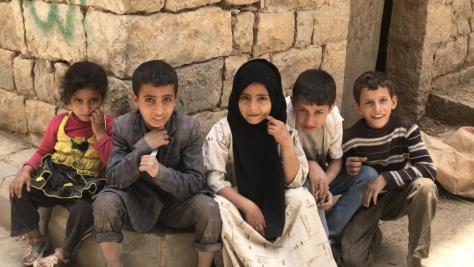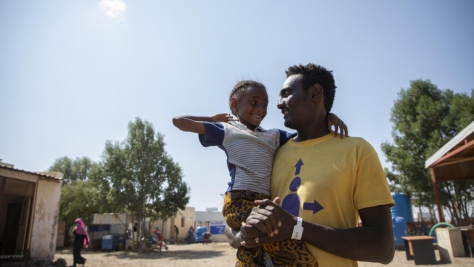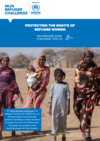16 Days Against Violence: UNHCR deeply disturbed by scale of violence against women
In 2012, some 12,000 incidents of sexual and gender-based violence were reported to UNHCR around the world, but many more cases never come forward.

Syrian refugee children attend a class in the Bekaa Valley, Lebanon. UNHCR chief António Guterres says humanitarian crises, like the conflict in Syria and Typhoon Haiyan in the Philippines, disproportionately affect children and adolescents and make them vulnerable. © UNHCR/S.Baldwin
GENEVA, November 25 (UNHCR) - UN High Commissioner for Refugees António Guterres said on Monday that the scale of sexual and gender-based violence was "deeply disturbing" despite the efforts of UNHCR and its partners to counter the "heinous" human rights abuse.
"In 2012, some 12,000 incidents were reported to UNHCR, but many more cases never come forward," Guterres said in a message to staff to mark the start of the annual 16 Days of Activism against Sexual and Gender-Based Violence.
He said that under this year's theme, "Safety in School," UNHCR aims to bring together boys and girls, teachers, parents, communities and partners to find durable and community-based solutions to prevent sexual and gender-based violence (SGBV) in school.
Guterres noted that humanitarian crises, like the conflict in Syria and Typhoon Haiyan in the Philippines, disproportionately affect children and adolescents. "Loss of family members, homes and ultimately futures, but also pre-existing gender inequalities and disruption of protective systems make boys, girls and youth extremely vulnerable to sexual and gender-based violence," he stressed.
The High Commissioner added that an estimated 60 million girls around the world are sexually assaulted on their way to school every year. Many boys and girls also face such violence in their classrooms and playgrounds. "This heinous human rights violation also carries significant human, social, and economic costs to our societies," he said.
"Recognizing the multi-faceted risks of SGBV that children and adolescents face, and the protective role education can play, UNHCR has focused in 2013 on integrating its strategies in the three core protection areas of SGBV, child protection and education," he explained. "Many operations are already developing mutually reinforcing programmes to protect girls and boys of concern from SGBV in school settings."
Guterres pledged that UNHCR, working closely with local partners and national authorities, would scale-up efforts to ensure safe learning environments, including through parent-teacher associations, youth clubs, extracurricular activities, the enforcement of codes of conduct, and confidential referral mechanisms for students to access health and psychosocial services.
"We know that by adopting a gender-sensitive approach to multisectoral services, for example by building separate latrines in schools or promoting the recruitment of female teachers among other measures, we can make girls and boys safer in school," he said.
Guterres noted that 148 UNHCR offices were implementing SGBV prevention and response programmes this year, making SGBV one of the highest selected objectives in country plans. But he added that safe learning environments "remain an under-programmed area in UNHCR operations."
UNHCR offices across the world, including the refugee agency's headquarters in Geneva, are holding events to mark the 16 Days of Activism and today's International Day to Eliminate Violence Against Women. For example, in addition to organizing cultural activities such as dancing, the UNHCR team in Burundi has also launched SGBV-related quizzes in schools as well as performances by teachers and students. Their objective is to focus on youth in order to help them understand how to prevent SGBV in schools, how to change behaviour in the long term to be more respectful of girls and women.
The 16 Days of Activism is an international campaign originating from the first Women's Global Leadership Institute in 1991. The 16 Days of Activism will run through to International Human Rights Day on December 10. It brings together UNHCR, partners, persons of concern and host communities worldwide in a united call to end sexual and gender-based violence in all its forms.
-

Discussion Papers 1- 4 UNHCR's Engagement in Humanitarian-Development Cooperation
Dec 2020 Cooperation with development organizations has long been part of UNHCR's approach to building long-term support and finding durable solutions for people forced to flee. Over the past few years, UNHCR's cooperation has both widened and deepened by engaging with global entities like the World Bank, regional entities like the African Development Bank, and development donors. These four papers explore how UNHCR can further cooperate with development actors and strengthen – what we often refer to as – the humanitarian-development nexus. -

Evaluation of UNHCR's Approach to Learning and Development for Workforce and Partners
Dec 2020 This centralised evaluation takes a holistic look at workforce learning and development (L&D) within UNHCR. Making use of desk reviews, mapping of L&D in other agencies, key informant interviews, a staff survey, and numerous validation workshops; the evaluation proposes recommendations at the strategic and practical levels for strengthening UNHCRs approach and delivery of learning and development. Attachments: Annex: ES/2020/11 Management Response and Executive Summary (.zip) -

Nearly 40 million at heightened risk of violence, discrimination and rights abuses as COVID spawns a 'coping crisis'
30 Nov 2020 Study reveals a severe deterioration in international efforts to protect the world's most vulnerable, with human rights violations on the rise. -

'Climate change is the defining crisis of our time and it particularly impacts the displaced'
30 Nov 2020 UNHCR's Special Advisor on Climate Action, Andrew Harper, outlines how global warming is driving displacement, and why decisive action is vital now. -

Mid-Year Trends 2020
30 Nov 2020 -

UN refugee chief appeals for funds to help refugees fleeing Ethiopia's Tigray to Sudan
30 Nov 2020 -

Climate Change / Forced Displacement - a dangerous crossing
30 Nov 2020 -

UNHCR chief calls for support for Sudan as it hosts Ethiopia refugees
29 Nov 2020 Filippo Grandi also launches an appeal for nearly US$150 million to help the government of Sudan look after the refugees. -

Protecting the rights of refugee women
27 Nov 2020
